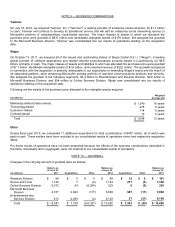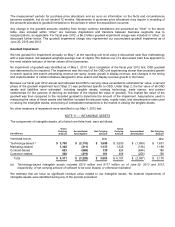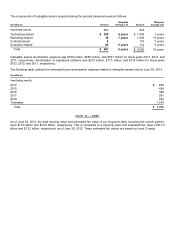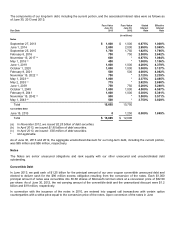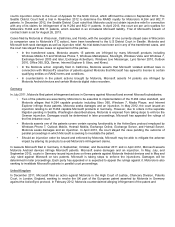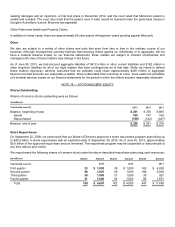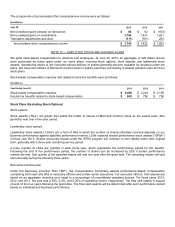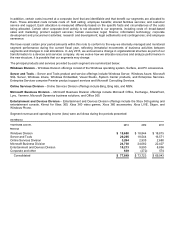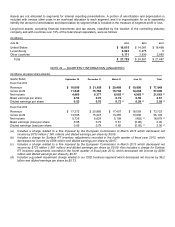Microsoft 2013 Annual Report Download - page 72
Download and view the complete annual report
Please find page 72 of the 2013 Microsoft annual report below. You can navigate through the pages in the report by either clicking on the pages listed below, or by using the keyword search tool below to find specific information within the annual report.
by Motorola’s Android devices. Since then, Microsoft and Motorola have filed additional claims against each other in the
ITC, in federal district courts in Seattle, Wisconsin, Florida, and California, and in courts in Germany and the United
Kingdom. In April 2012, following complaints by Microsoft and Apple, the European Union’s competition office opened two
antitrust investigations against Motorola to determine whether it has abused certain of its standard essential patents to
distort competition in breach of European Union antitrust rules. In June 2012, we received a request for information from
the U.S. Federal Trade Commission (“FTC”) apparently related to an FTC investigation into whether Motorola’s conduct
violates U.S. law. The nature of the claims asserted and status of individual matters are summarized below.
International Trade Commission
The hearing in Microsoft’s ITC case against Motorola took place in August 2011 on seven of the nine patents originally
asserted in the complaint. In December 2011, the administrative law judge (“ALJ”) issued an initial determination that
Motorola infringed one Microsoft patent, and recommended that the ITC issue a limited exclusion order against Motorola
prohibiting importation of infringing Motorola Android devices. In May 2012, the ITC issued the limited exclusion order
recommended by the ALJ, which became effective on July 18, 2012. Microsoft has appealed certain aspects of the ITC
ruling adverse to Microsoft and Motorola has appealed the ITC exclusion order to the Court of Appeals for the Federal
Circuit. In addition, in July 2013, Microsoft filed an action in U.S. district court in Washington, D.C. seeking an order to
compel enforcement of the ITC’s May 2012 import ban against infringing Motorola products by the Bureau of Customs
and Border Protection (“CBP”), after learning that CBP had failed to fully enforce the order.
In November 2010, Motorola filed an action against Microsoft in the ITC alleging infringement of five Motorola patents by
Xbox consoles and accessories and seeking an exclusion order to prohibit importation of the allegedly infringing Xbox
products into the U.S. In April 2012, the ALJ found that Xbox products infringe four of the five patents asserted by
Motorola. The ALJ recommended that the ITC issue a limited exclusion order and a cease and desist order. Both
Microsoft and Motorola sought ITC review of the ALJ’s findings. In June 2012, Microsoft filed a motion to terminate the
investigation as to certain patents based on facts arising as the result of Google’s acquisition of Motorola. The ITC
determined that it would review the ALJ’s initial determination in its entirety and remanded the matter to the ALJ (1) to
apply certain ITC case precedent, (2) to rule on Microsoft’s June 2012 motion to terminate, and (3) set a new target date
for completion of the investigation. The ALJ held a hearing in December 2012 and set a target date for a final ITC ruling in
July 2013. At Motorola’s request, the ITC terminated its investigation as to four Motorola patents, leaving only one
Motorola patent at issue before the ITC. In March 2013, the ALJ ruled that there has been no violation as to the remaining
Motorola patent. Motorola sought ITC review of the ALJ’s determination, which the ITC denied in May 2013.
U.S. District Court
The Seattle District Court case filed in October 2010 by Microsoft as a companion to Microsoft’s ITC case against
Motorola has been stayed pending the outcome of Microsoft’s ITC case.
In November 2010, Microsoft sued Motorola for breach of contract in U.S. District Court in Seattle, alleging that Motorola
breached its commitments to standards-setting organizations to license to Microsoft certain patents on reasonable and
non-discriminatory (“RAND”) terms and conditions. Motorola has declared these patents essential to the implementation
of the H.264 video standard and the 802.11 Wi-Fi standard. In suits described below, Motorola or a Motorola affiliate
subsequently sued Microsoft on those patents in U.S. District Courts, in the ITC, and in Germany. In February 2012, the
Seattle District Court granted a partial summary judgment in favor of Microsoft ruling that (1) Motorola entered into binding
contractual commitments with standards organizations committing to license its declared-essential patents on RAND
terms and conditions; and (2) Microsoft is a third-party beneficiary of those commitments. The court rejected Motorola’s
argument that Microsoft had repudiated its right to a RAND license, and ruled a trial is needed to determine whether
Motorola is in breach of its obligation to enter into a patent license with Microsoft and, if so, the amount of the RAND
royalty. In April 2012, the court issued a temporary restraining order preventing Motorola from taking steps to enforce an
injunction in Germany relating to the H.264 video patents. In May 2012, the court converted that order into a preliminary
injunction. Motorola appealed the


